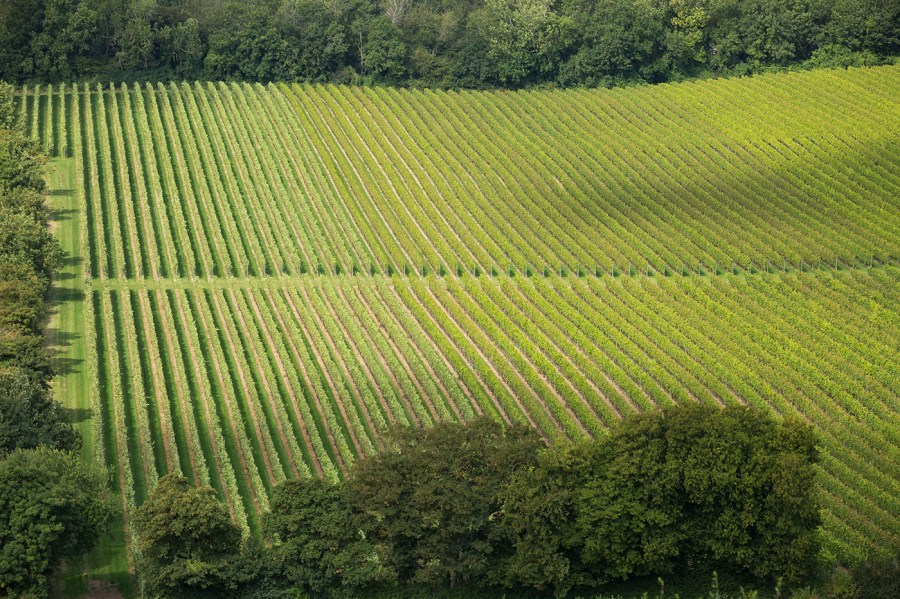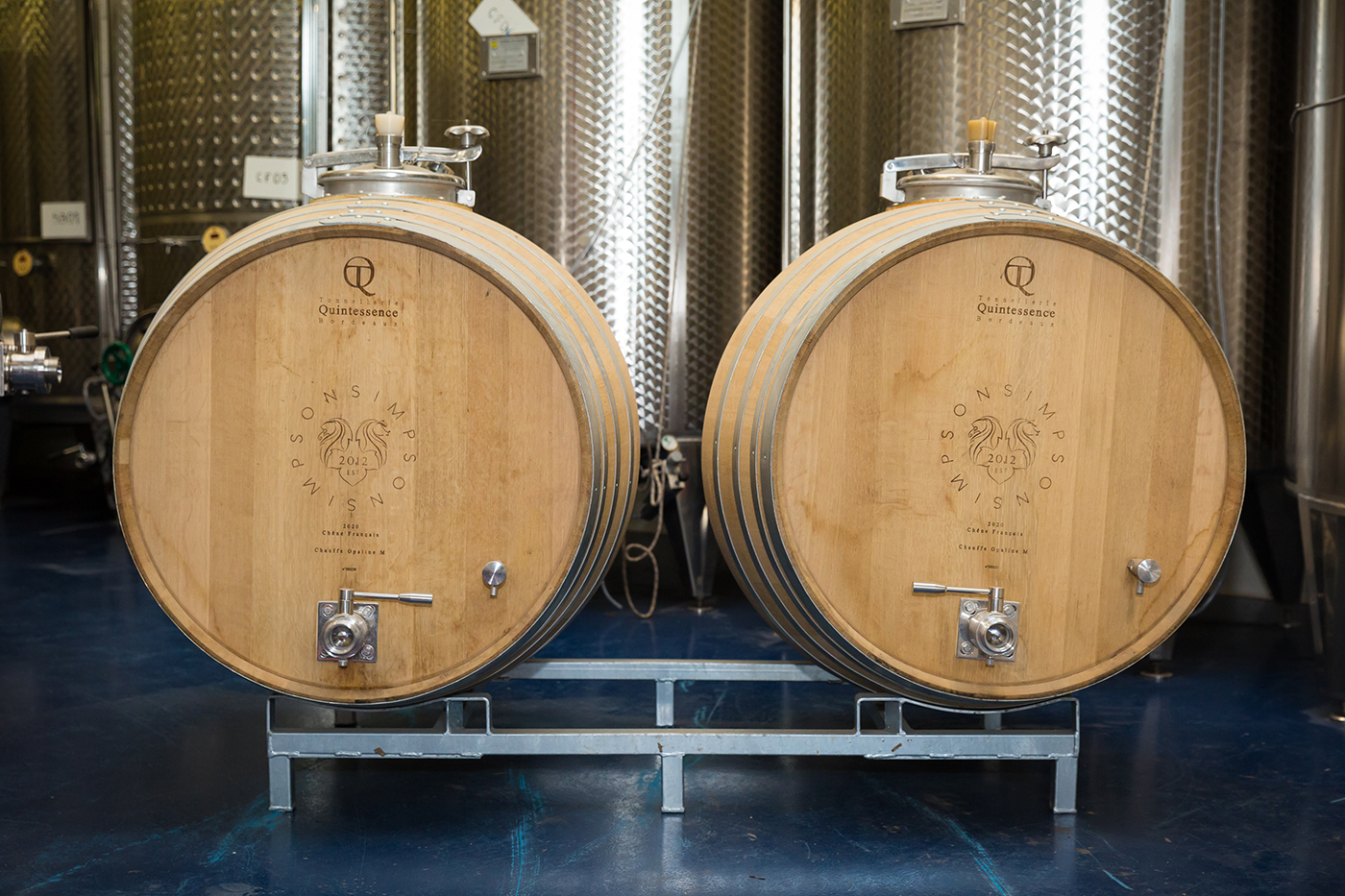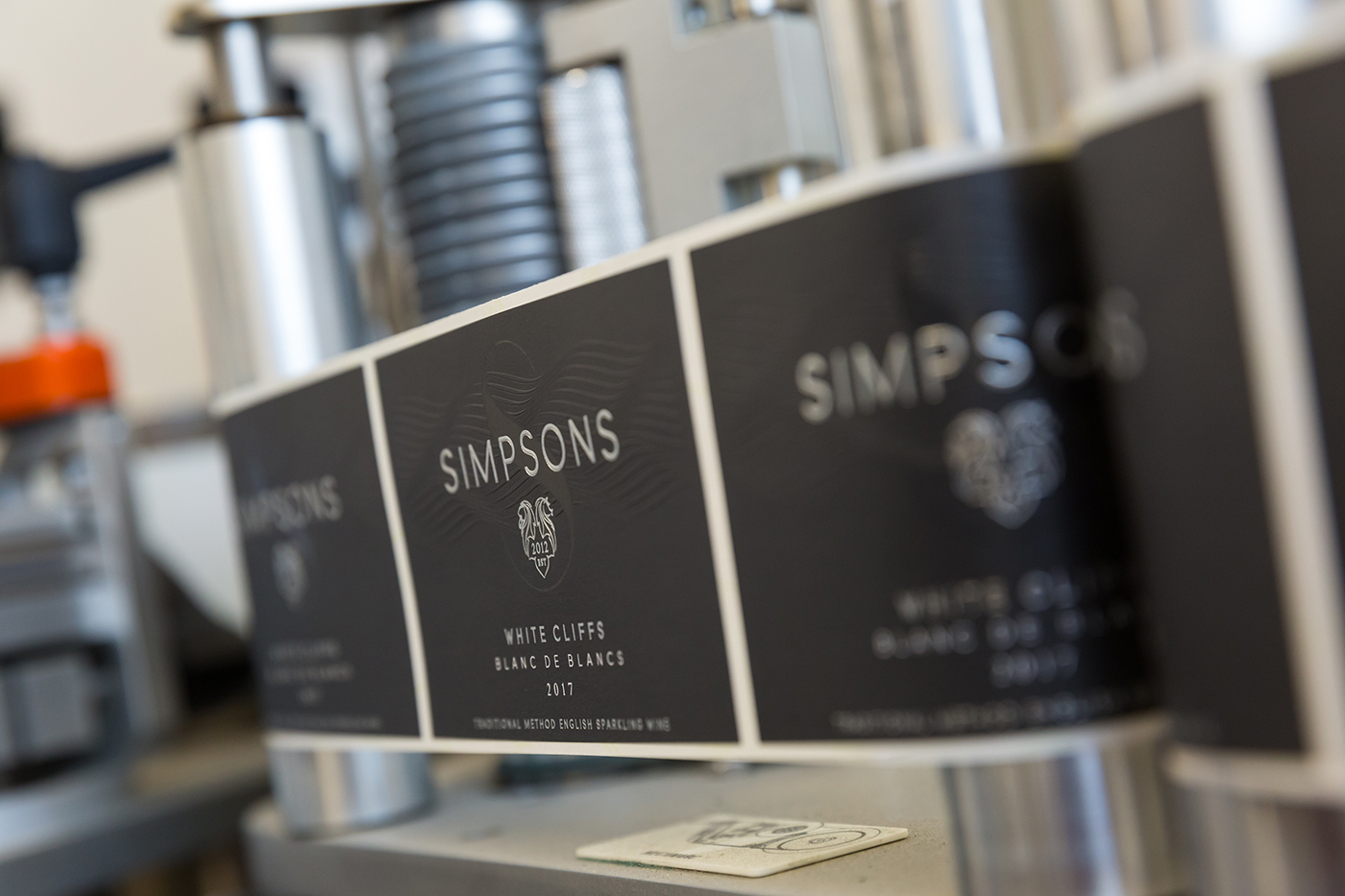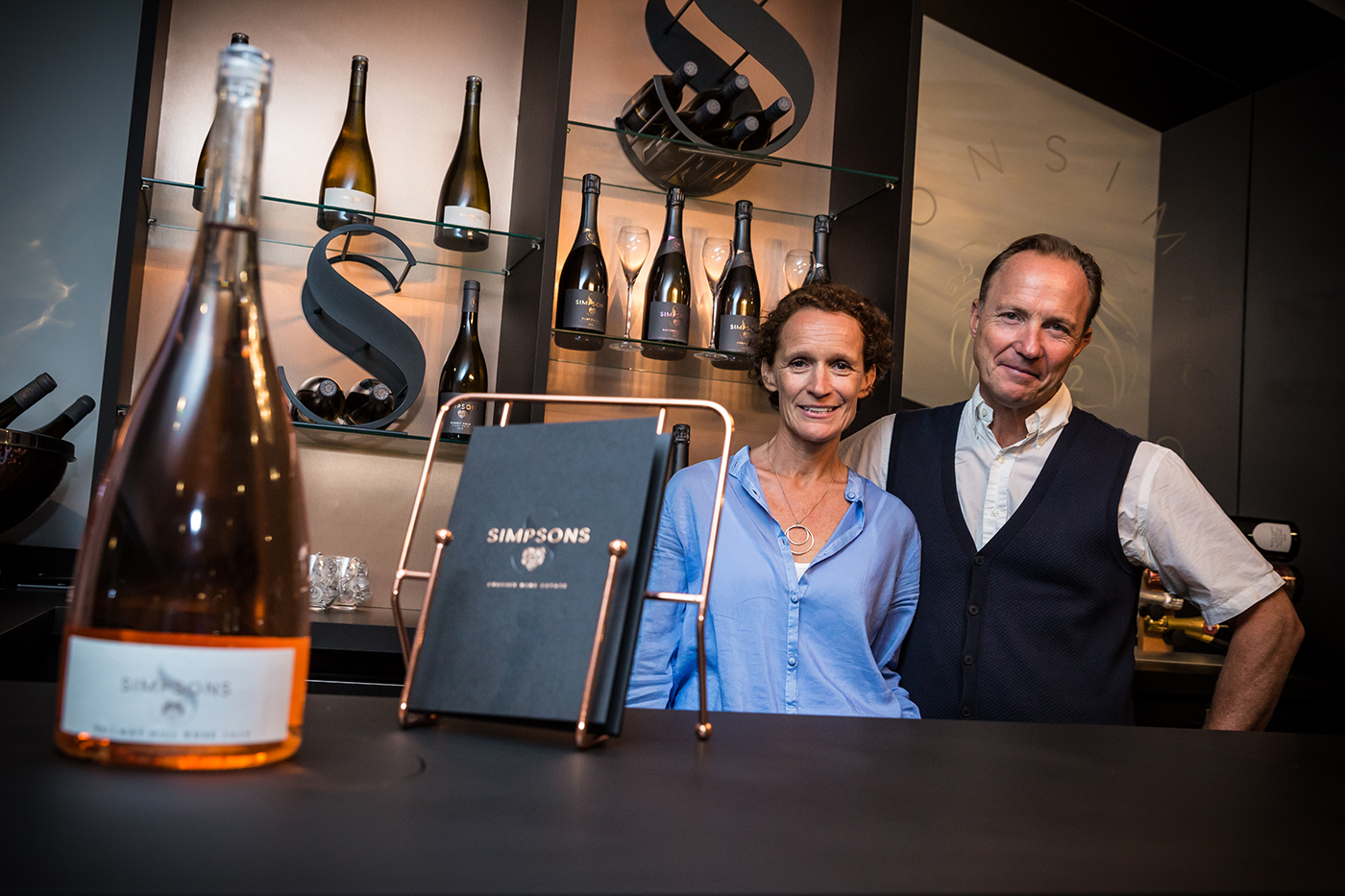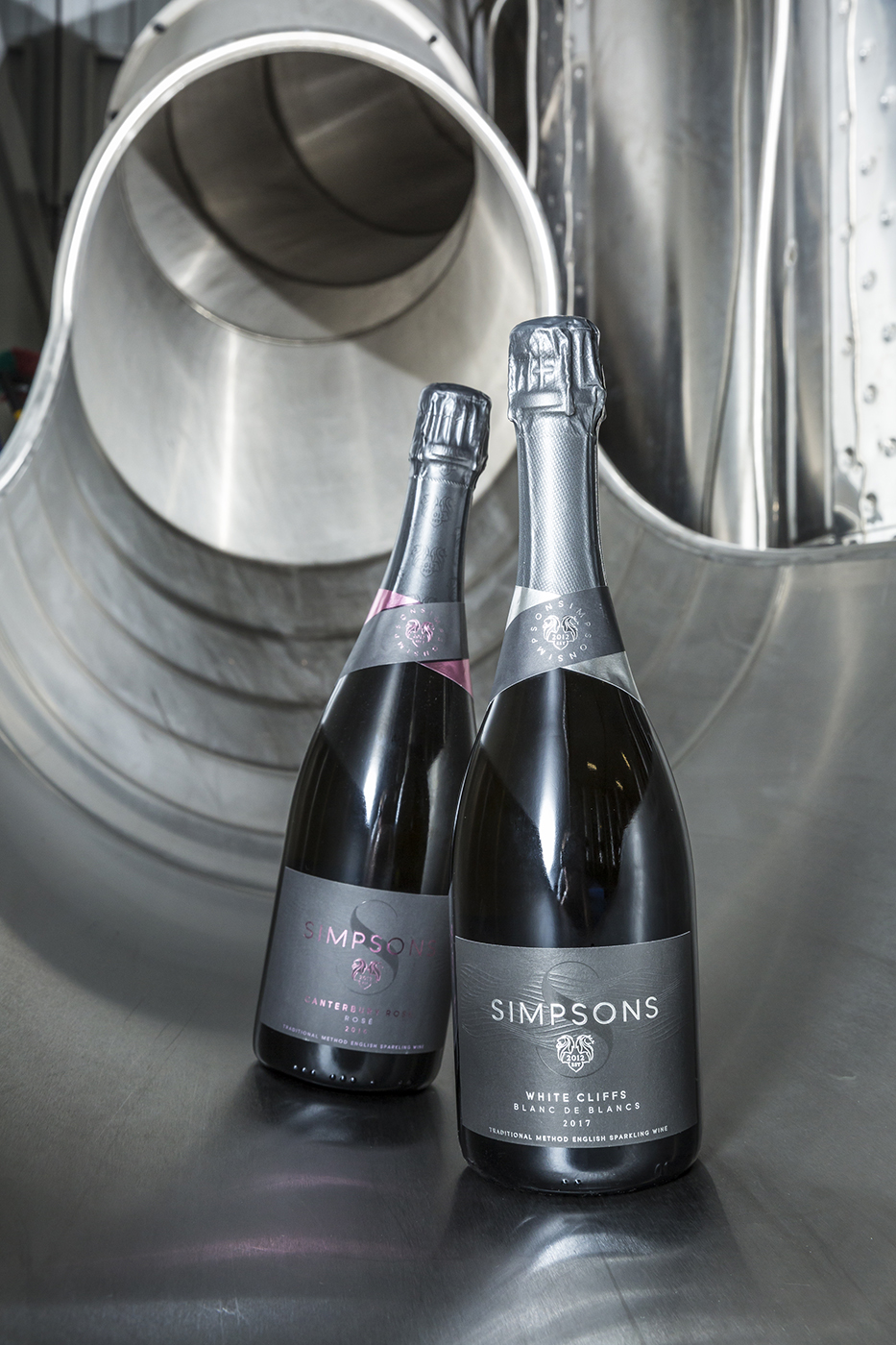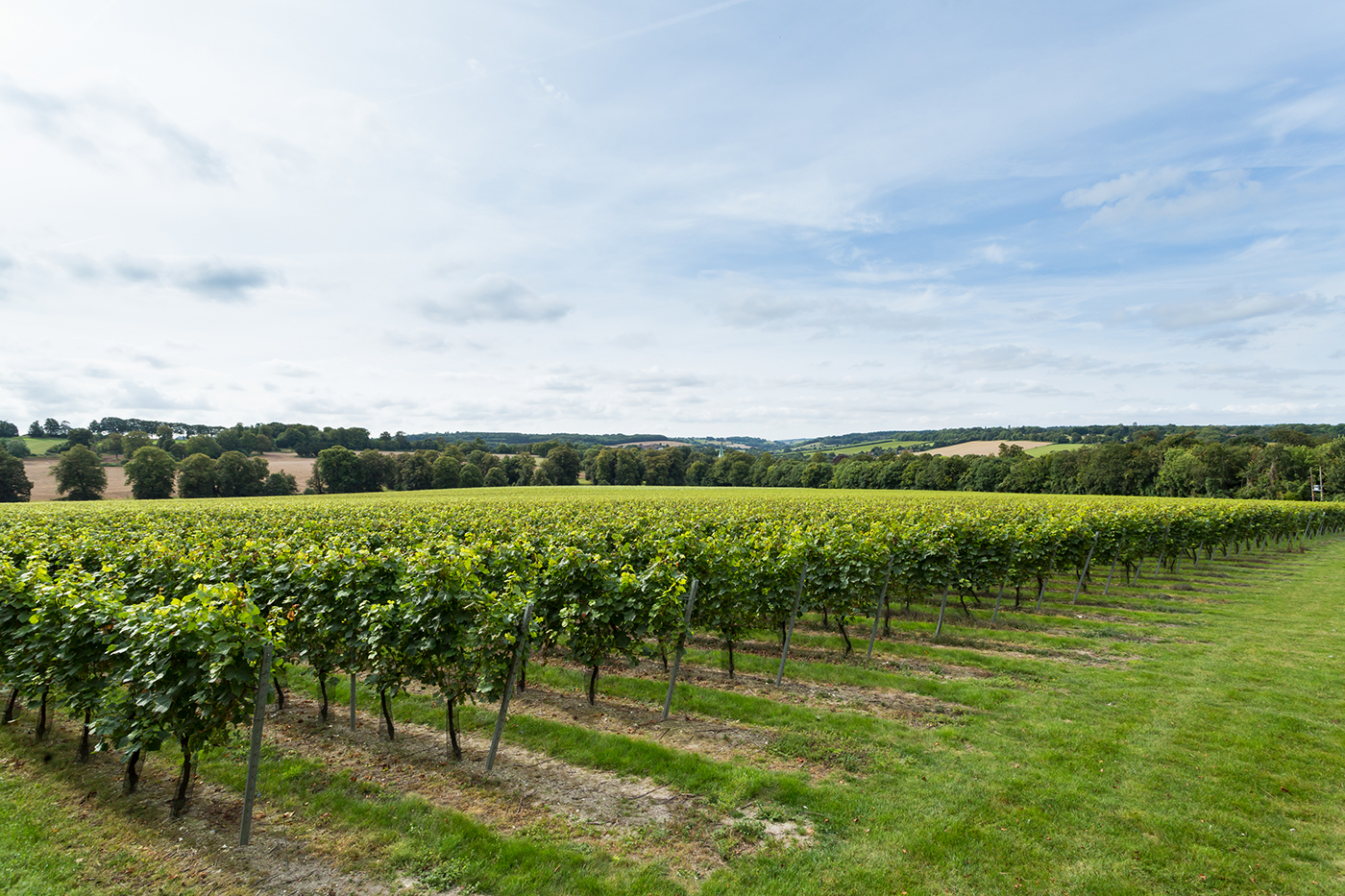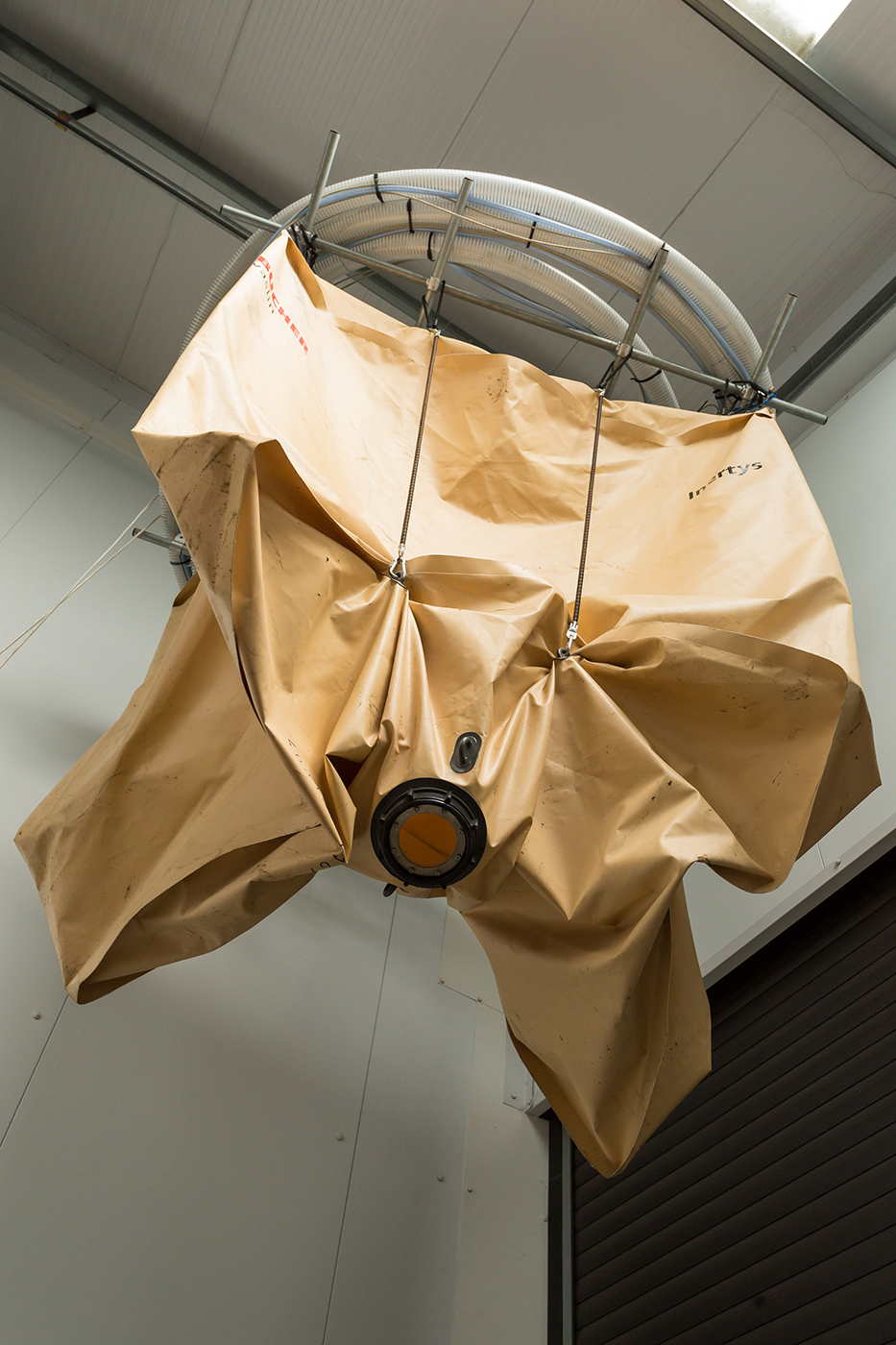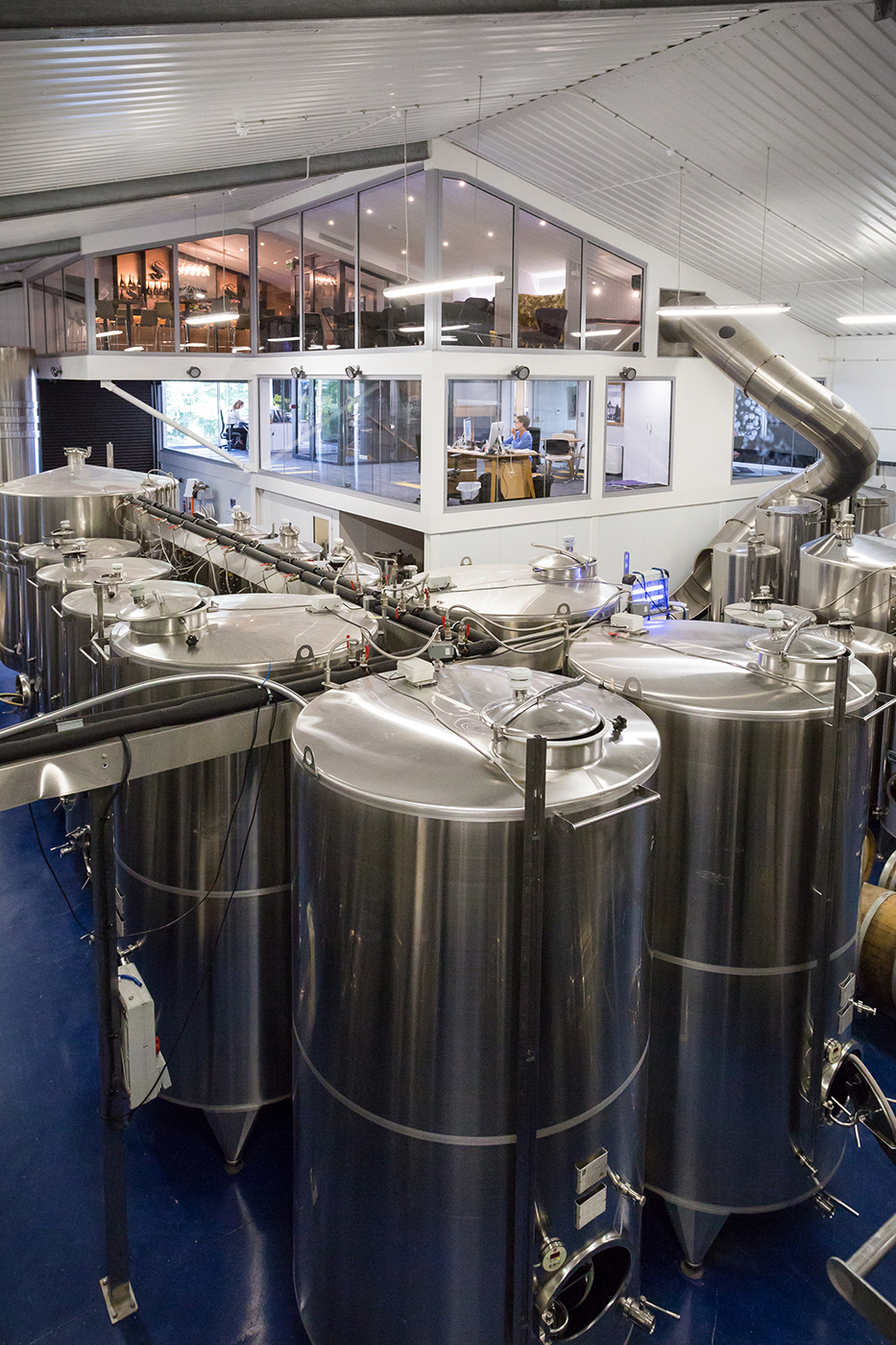A spirit of adventure and a desire to help transform the reputation of the Languedoc from a low-quality, high-volume wine producer to a high-quality, low-volume wine producer, took Charles and Ruth Simpson to France and Domaine de Sainte Rose, nearly 20 years ago. Vineyard speaks to Charles and Ruth to find out how that same desire to be part of an emerging and evolving region brought them back to the UK in 2012 – with their aspiration this time to help drive the extraordinary development that has seen England and Wales grow from being a little known and insignificant wine producer, to the most exciting and dynamic wine producing area in the world.
The decision to cast aside international careers to establish and run a high-quality, boutique, wine business in rural France was driven by Charles and Ruth’s desire to work together and to create a family business of their own. “It involved a large degree of risk and a huge amount of determination to realise this mutual dream,” exclaimed Charles. “We have now been growing grapes and making wine for almost 20 years, in France and since 2014, in England, so it has been the main part of our career. Prior to that Charles worked in the pharmaceutical industry and I worked in the humanitarian sector,” explained Ruth.
“While living in France we frequently read about the developments in the UK with interest, so we decided to buy 30 hectares of land in Kent in 2012, which we started planting in 2014. There was no real firm timeframe initially, and we hadn’t created any fixed plans on how or where the wines were going to be made – we considered all options including having our wines made at a contract winery. However, events snowballed with a very positive momentum, and we sometimes feel we have ‘sleepwalked’ into the well-established business we have today,” commented Charles.
Terroir and provenance
The pristine Elham Valley is a designated AONB (Area of Outstanding Natural Beauty), an unspoilt seam in the North Downs of Kent, where the contours of the land, the climate and the soil could scarcely be improved upon for viticulture. “There was no more important consideration in our quest to create distinguished English wine, than the quality and suitability of our land. Our intensely lime-rich chalk soil, forms part of the same chalk ridge that stretches from southern England to the French Champagne region and on to Burgundy, and is without doubt the most desirable for the cultivation of Pinot Noir, Pinot Meunier and Chardonnay,” commented Charles. “The vineyards and the wines have names inspired by local places or geological features, further anchoring their provenance,” added Ruth.
Roman Road and Railway Hill Vineyards
The first 10 hectares of Chardonnay, Pinot Meunier and Pinot Noir were planted on the estate in 2014. “This is our Roman Road Vineyard, situated alongside the route the Roman’s first marched when invading England in AD 43 – bringing with them the first vines. A further 20 hectares of the same three grape varieties were established on the southern slopes of the village during 2016, 2017 and 2020. This is our Railway Hill Vineyard, so called because the Canterbury to Folkstone light railway passed through this site in the late 19th and first half of the 20th Century,” explained Ruth.
“Across our vineyards, we have a total of nine different clones of Chardonnay (including Burgundian clones 548 and 96), eight different Pinot Noir clones (including Burgundian clones 115 and 777) and seven different Pinot Meunier clones. With our chalk and flint soils, the active calcium carbonate is high, so the vines are on 41b and Fercal rootstocks.
“We made the decision to select the Burgundian still wine clones as well as Champagne clones for all three of our vineyard plantations, in the first instance so that we had an interesting blend of clones for our sparkling base wines, but latterly with the hopes that in good years we might be able to experiment with some still wine production. We are obviously incredibly pleased that we did, as with five harvests under our belt, we believe that we can successfully create world class Chardonnay and Pinot Noir using these Burgundian clones on an annual basis,” said Ruth.
“Our Estate Manager and Viticulturalist Darryl Kemp, who originates from New Zealand, is hugely experienced and manages our two vineyard sites. He keeps our feet firmly grounded as to the realities of growing grapes in England as opposed to our experience growing grapes in the south of France,” said Charles.
As labour has been an issue during the summer for many vineyards, Simpsons’ Wine Estate is planning well ahead for harvest. “We hope that most of our pickers will come from Pro-Force in Canterbury and they will be assisted by our small, local vineyard team,” commented Ruth.
People, places, product
“The Simpsons’ brand is encapsulated in the phrase – Savoir-faire with British flair,” explained Charles, “and it is based on three pillars.”
“Firstly, ‘Savoir-faire’, given our British/French heritage, the fact that we have been growing grapes and making wine since 2002, and due to the collective experience of our very international team.
“Secondly, ‘Provenance and Place’, highlighting the importance of the iconic chalk terroir of Kent, our focus on estate grown grapes, along with the integrity and quality of our product – which is managed from grape to glass.
“Thirdly, ‘Innovation and Sophistication’, given our focus on still wines and unique styles, the use of the Inertys press system, our innovative luxury packaging and our international accolades (DWWA, IWC),” Charles added.
The crest in their stylish logo reflects the three key components of the Simpsons’ Wine Estate brand. “The lion is from the Simpsons’ ancestral crest, so represents us – the people. The white horse comes from the flag of Kent – i.e. the place and, of course, where their manes interconnect you will find the shape of a vine leaf, which is our product,” said Charles.
“For all brand and packaging design we work with a freelance designer, who is based in Cornwall,” Ruth explains. “We were the first wine brand that she had worked with so she naturally brought a fresh and unbiased approach to our brand design.”
Winery slide
The Simpsons’ winery is unique with its gleaming helter skelter slide that starts from the second-floor glass-walled tasting room, appropriately named The Glass House, and rapidly transports willing visitors, and staff, straight down to the winery.
“The slide is there for a good reason – not just fun,” laughed Charles, “it helps to disarm our visitors and demystify the winemaking process. The winery is encased in glass walls so very visual in order to celebrate the winemaking process. It’s our canvas and we want all to see – but we must keep it clean and tidy.
“Sometimes on group tours, wine snobbery can be a barrier to younger wine drinkers who are fascinated to learn, but often a little intimidated. The slide becomes a disarming tool to remove any intimidation, it’s a great leveller. Everyone is beaming after a thrilling ride down the slide. They are then relaxed enough to ask ‘any’ question – after all play is how we learn. It also makes for a very memorable experience, so if you can’t do a ‘chateau’ do a slide!” Charles exclaimed.
Winemaking philosophy
In 2016, Charles and Ruth created a state-of-the-art winery, located within walking distance of the vineyard sites, and it now has a capacity of 350 tonnes. The wines at Simpsons’ Wine Estate are made by Australian Head Winemaker Leigh Sparrow, who also makes the wine at Domaine de Sainte Rose. “Leigh leads a small, young and dynamic winemaking team and we work closely with him to develop consistency and a house style,” explained Charles.
“Our winemaking methods are designed to promote the purest expression of the fruit and our Kentish terroir. The proximity of the winery to the vines is critical in the creation of top-flight sparkling wine as minimal transportation and manipulation of the grapes prior to pressing protects the purity of the juice and minimises skin contact or colour bleed,” added Ruth.
The press room currently contains one eight-tonne and one three-tonne Bucher Inertys – but another eight-tonne is on the cards! “The grapes are pressed in an inert atmosphere, under nitrogen, to avoid any oxidation so that we retain the delicate aromas and fresh fruit flavours of each grape variety. The Inertys system allows us to recover and recycle the nitrogen for several press cycles. We think this has a marked effect on the flavour profiles of our wines, which reflect very pure and true varietal characteristics,” commented Charles.
A component of our Rabbit Hole Pinot Noir is fermented in 600 litre Tonnellerie Quintessence French oak barrels, which is designed to allow for gentle pigeage. One of the many resources we are fortunate enough to share with Sainte Rose is our oak barrels. We buy new barrels for our southern French wines, and then bring them to England for second, third or fourth use for our sparkling bases and still wines here,” added Charles.
Coming soon…
Two new super-premium still wines, called the Q Class, will be launched in November. They are a limited edition Pinot Noir and Chardonnay, both hand-crafted from grapes carefully selected from our best vines. “We have only produced magnums, and these will be available on allocation, retailing at £100,” said Charles.
Routes to market
The initial plan was for the Simpsons’ Wine Estate wines to be an entirely on-trade brand – in contrast to the Domaine de Sainte Rose, which is mainly focussed on the off-trade. “However, when the pandemic hit, we were fortunate to already have a strong connection with Waitrose, Majestic, Naked and other retailers established through our Sainte Rose wines – and this saved the day! We have now developed a second label for our Simpsons’ wines for Waitrose, Majestic and Naked, so that we can operate in both the on and off trade,” explained Charles.
“Direct to consumer sales are certainly on the rise and although we do not have a cellar door shop as yet, the tours and online purchases are generating good sales. In the on-trade we are with Hallgarten nationally, plus direct to many local establishments and The Pig Group. We have great support from independent retailers, such as Hawkins Bros, Grape Britannia, Corkk, Heritage Wines and Robersons Wine.
Going forward with exports
Simpsons wines are currently exported to Norway, Sweden, Denmark, Finland, Poland, Estonia, and Canada – both Ontario and Quebec. “Exports, Brexit notwithstanding, is a huge potential growth area for the industry,” commented Charles. “Most of our importers also import Domaine de Sainte Rose so our experience of exporting has been extremely useful,” he added.
“At the moment our export successes are predominately in the countries that operate a government monopoly system, including Norway, Finland, Sweden and Canada. I’m sure this is helped by the fact that the UK is now a recognised wine category globally – so the monopolies are therefore obliged to produce tenders,” commented Charles.
“Domaine Sainte Rose is already well established in the US, so we have markets waiting for our Simpsons’ Wine Estate wines – as soon as we have the volumes. The US export market is a harder nut to crack, as the three-tier system makes operations and logistics more challenging. In 2010 we took the decision to set up our own US company, which is based within an import and warehousing organisation in New Jersey. This makes distribution so much simpler and enables us to ensure supply, and therefore maintain good relations, with our distributors throughout the States. As soon as we have the volumes of Simpsons wines to export to the US, we will be able to ‘flick the switch’ and ship immediately to ready primed markets that are eagerly awaiting our English wines. It helps enormously that we have already built great relationships with our distributors, so they will have the confidence to hand sell our wines,” Charles added.
Ruth has been part of the WineGB Export Committee since its creation in 2017 and the group meets regularly and works closely with DIT (Department for International Trade), to provide guidance for other producers for export. “There is an area on the WineGB website dedicated to explaining how to approach export and developing opportunities for exporters to participate in. What’s missing is decent financing and government funding to ensure that smaller producers can properly engage,” commented Ruth.
Anglo-French synergy
Right from the start the Simpsons’ Wine Estate venture has benefited from shared resources with the French domaine, Sainte Rose. “This sharing of resources has provided huge advantages, efficiencies and cost savings through well established relationships with French and other European suppliers – as have our skills and experience in running a wine business. We used our French nursery to supply our vines, and a French team to plant them – who jumped at the opportunity. We also have an extensive network of dry goods suppliers who we are able to deal with direct – which is quite a cost saving when compared to prices here,” commented Ruth.
“Brexit is a huge frustration and we have found some suppliers are now refusing to ship to the UK, because of all the additional paperwork and challenges in finding transporters. We are so fortunate that we can organise for all our dry goods, even bottles, to be delivered to Sainte Rose, where we consolidate and ship to the UK using WineFlow – simplifying the paperwork and the hassle factor,” said Charles.
“We also have a great synergy with our customers. We have established sales channels all over the world with our Sainte Rose wines and our customers keenly followed the journey of Simpsons’ Wine Estate – so when we released our English wines they were eagerly awaited in many markets and started selling in Europe before they sold in the UK.”
“Of course, another resource we share with our French domaine is our winemaker, Leigh– we keep him busy as he does the vintage in France and then comes over to make the wines here,” Charles added.
The Wine Garden of England
Simpsons’ Wine Estate was in essence the instigator of the Wine Garden of England, a collaborative tourism venture, which Charles chairs. “The Wine Garden of England links seven of Kent’s top wine producers to create a world-class wine trail and visitor experience in the county. Our aim is to significantly increase momentum behind wine tourism in Kent by operating as a partnership, adding value to the efforts of individual brands, plus we all promote each other’s estates and wines,” Charles added.
Sustainable Wines of Great Britain
Simpsons’ Wine Estate are members of Sustainable Wines of Great Britain (SWGB) and awaiting their first audit for certification. “In line with the SWGB certification scheme, our objectives in the vineyard are to maintain and improve soil health, to conserve the vineyard environment and promote biodiversity, to reduce pesticide and fertiliser inputs and to reduce our carbon footprint per hectare,” explained Ruth. “We are looking at new technologies, such as robotic weeders, to help achieve these objectives,” she added.
“This shared undertaking to secure environmental sustainability at the heart of UK wine production continues into our winery, where we are working to reduce our water and non-renewable energy consumption. In 2021 we successfully achieved one of these goals with the installation of a 30kw solar photovoltaic (PV) array, which at optimum production, covers all normal office and winery functionality,” commented Charles.
“We also subscribe to the Walpole Sustainability Manifesto, which in addition to its pledge to safeguard the environment and natural resources, also advocates equal rights and respectful working conditions, promotes the transition towards a circular economy and encourages businesses to work with ‘responsible’ suppliers who can provide traceability across their supply chain. We apply these principles to all product development, with particular emphasis on packaging recyclability,” Charles added.
Expansion plans
“We are fortunate to be small and agile as a business, to grow organically and respond to demand pressure – it’s all about the right people and we have a great team,” explained Charles. “We don’t have a cellar door – as yet – but we have an increasing number of customers dropping by so the next step is to explore the possibility of a shop,” he added.
“We have also seen an amazing interest in events here and have offered exclusive pop-ups with a Michelin-star chef, and regular collaborations with a superb local deli. The Glass House tasting room is high above the winery, and we can create a great atmosphere and stunning setting for events with coloured lighting reflecting off the tanks – and of course we have the only winery helter skelter slide in (probably) the world!” Commented Ruth.
“Our current expansion includes our new 800 sq m building, renovated by AR Davies, with solar PV roof panels and temperature control. It will provide storage for our wines undergoing secondary fermentation as well as a great space for mobile bottling lines like BevTech. It will also free space up to expand the current winery. The outside is yet to be landscaped, but will have a row of vines – of course – and as it’s a sun trap, some decking with picnic tables for a delightful alfresco glass of wine.
Anticipating further growth in sales as we approach our optimum size, we are also looking for another 10 hectares to plant,” said Charles.
“Across the UK wine sector as a whole, there is lots of creativity and diversity emerging, which is very positive, but at the same time it’s important to have a hero product – the Classic Method – to protect quality, price point and premium positioning.
“There is still lots of room for growth in export markets for luxury British products. For this reason, we are part of the Walpole group which promotes and develops luxury British products worldwide to bolster our positioning and branding. I also think there is lots of headspace for still wines both domestically and in the export markets,” commented Ruth.
Favourite wines
The Sparkling wine producers, who caught our attention and sparked our interest in England were Nyetimber and Ridgeview. The still wine that convinced us that it was even possible in England was Gusbourne’s Guinevere Chardonnay 2011,” said Charles.

